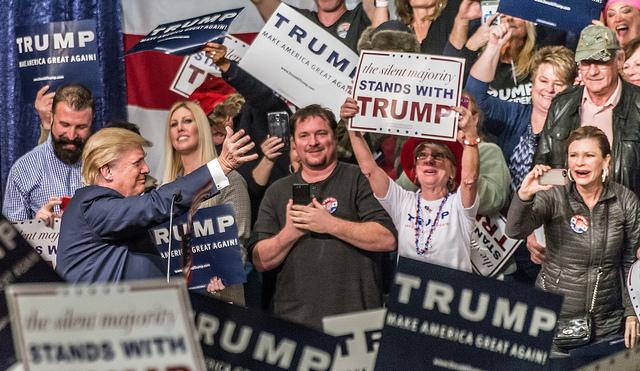Trump versus the West
Posted By Dominique Moisi on September 29, 2016 @ 11:00

In less than 50 days, we will know who the next president of the United States will be. Though Democratic candidate Hillary Clinton has a lead in national opinion polls [1], it’s narrowed to a near-tie, meaning that her Republican opponent, Donald Trump, could well triumph. Indeed, US observers are now examining [2] what a President Trump’s first 100 days in office would entail. It’s not pretty.
With Trump’s candidacy, reality has become more incredible than fiction. No Hollywood scriptwriter would have dared to invent a presidential candidate—much less an actual president—as ridiculous as Trump. In comparison, Kevin Spacey’s Frank Underwood, the evil and conniving protagonist of the American version of the television series House of Cards, who actually commits murder during the series, looks like some kind of Kant-Lincoln hybrid.
Trump is America’s reality-TV Mussolini. He is not just a populist, isolationist politician; he is a caricature of one. By electing him to the presidency, American voters would achieve what neither the Soviet Union during the Cold War nor Islamist fundamentalists today ever could: undermining—and potentially destroying—the democratic system of the world’s greatest power.
Consider the support for Trump provided by Russian President Vladimir Putin, arguably the West’s most prominent authoritarian nemesis. Given his denigration of the West’s democratic model, the master of the Kremlin views Trump’s candidacy as a divine gift. Trump’s election would be definitive proof [3] that, despite more than two centuries of struggle against the Enlightenment spirit of reason and freedom, the gods of despotism have not forsaken their earthly agents.
Even if Trump doesn’t win, the fact that he could come so close—that he was not roundly dismissed as a candidate by US voters, not to mention the entire Republican Party establishment—doesn’t bode well for the values and principles upon which Western democracies rest. But a Trump victory would obviously be far more destructive. And simply assuming that it’s not going to happen, that the scenario is too absurd and dangerous to consider, will only make it more likely.
The United Kingdom’s June vote to leave the European Union is a case in point. Virtually all of the experts agreed that Brexit would have serious economic repercussions, and many pro-EU Britons felt so confident in their fellow voters that they didn’t bother to vote. Alas, ‘Leave’ won the day, triggering financial and economic turmoil and a spike in hate crimes. The future of the UK and Europe remains uncertain [4].
The driving forces behind the Brexit vote were fear and false nostalgia. Britons were promised a return to an idealised past of peace and prosperity, when they were masters of their own destiny. And they were told that insidious external forces—from immigrants to EU institutions—were the reason for all of their problems. The ‘Remain’ campaign, for its part, was heavy on facts and light on emotion.
The parallels with the current US presidential campaign are arresting. As Clinton struggles to inspire, Trump is stirring up people’s basest passions.
For white Americans, in particular—faced with the evolution of a continent that, in less than 30 years, will be dominated by Spanish-speakers—the mixture of fear and nostalgia served up by the Trump campaign is a powerful potion. Unsurprisingly, Trump has done particularly well among white men without college degrees, and relatively poorly among those with less positive memories of the past: minorities and women.
In my 2009 book The Geopolitics of Emotion, I argued that, whereas the twentieth century had been the century of ideology, the twenty-first century would be the century of identity. Much to my dismay, the Brexit vote and Trump’s candidacy seem to vindicate my forecast. Identity politics—including issues of sovereignty and security—has replaced rational economic concerns as the main driver of voters’ choices. Man does not, after all, live by bread alone.
To be sure, economic factors contribute to the emergence of identity politics. Rising income and wealth inequality have weakened the middle class, spurring many to ‘revolt’ against the elites. As the British journalist Martin Wolf put it [5], for many, liberal democracy and globalised capitalism no longer seem to mesh, and indeed may directly contradict each other. Now, many seem to want to tear down both of them.
But the situation has escalated considerably, owing to a terrorist threat that has been blown out of proportion, together with general fearmongering about immigrants. People may be convinced to live in relative poverty, if it means staying safe. But, when faced with the prospect of both poverty and insecurity, fear joins anger to overwhelm their reason.
In such a context, everything becomes possible—even something as unthinkable as a Trump presidency. The fact that the establishment is represented by Clinton, with her long-standing unpopularity and portrayal by the media and Republicans as a frail old woman, doesn’t help matters.
Americans—but not only Americans—will watch the remainder of the campaign with the curiosity of Roman citizens watching a battle between gladiators. But we are not in a Roman circus. The future of the West, if not of democracy, depends on which contestant is still standing at the end of the race.
Article printed from The Strategist: https://aspistrategist.ru
URL to article: /trump-versus-west/
URLs in this post:
[1] polls: http://www.nytimes.com/interactive/2016/us/elections/polls.html?_r=0
[2] examining: http://worldif.economist.com/article/12166/world-v-donald
[3] definitive proof: https://www.project-syndicate.org/commentary/russian-lessons-for-us-politics-by-nina-l--khrushcheva-2016-09
[4] remains uncertain: https://www.project-syndicate.org/focal-points/brexit-limbo
[5] put it: https://www.ft.com/content/e46e8c00-6b72-11e6-ae5b-a7cc5dd5a28c
Click here to print.